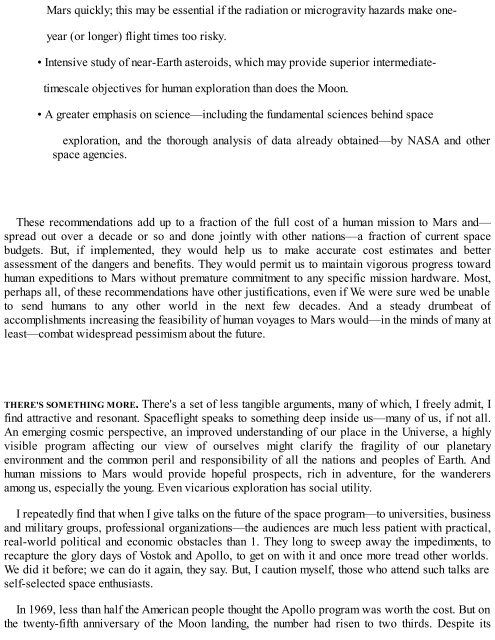Pale Blue Dot ( PDFDrive.com ) (1)
Create successful ePaper yourself
Turn your PDF publications into a flip-book with our unique Google optimized e-Paper software.
Mars quickly; this may be essential if the radiation or microgravity hazards make oneyear<br />
(or longer) flight times too risky.<br />
• Intensive study of near-Earth asteroids, which may provide superior intermediatetimescale<br />
objectives for human exploration than does the Moon.<br />
• A greater emphasis on science—including the fundamental sciences behind space<br />
exploration, and the thorough analysis of data already obtained—by NASA and other<br />
space agencies.<br />
These re<strong>com</strong>mendations add up to a fraction of the full cost of a human mission to Mars and—<br />
spread out over a decade or so and done jointly with other nations—a fraction of current space<br />
budgets. But, if implemented, they would help us to make accurate cost estimates and better<br />
assessment of the dangers and benefits. They would permit us to maintain vigorous progress toward<br />
human expeditions to Mars without premature <strong>com</strong>mitment to any specific mission hardware. Most,<br />
perhaps all, of these re<strong>com</strong>mendations have other justifications, even if We were sure wed be unable<br />
to send humans to any other world in the next few decades. And a steady drumbeat of<br />
ac<strong>com</strong>plishments increasing the feasibility of human voyages to Mars would—in the minds of many at<br />
least—<strong>com</strong>bat widespread pessimism about the future.<br />
THERE'S SOMETHING MORE. There's a set of less tangible arguments, many of which, I freely admit, I<br />
find attractive and resonant. Spaceflight speaks to something deep inside us—many of us, if not all.<br />
An emerging cosmic perspective, an improved understanding of our place in the Universe, a highly<br />
visible program affecting our view of ourselves might clarify the fragility of our planetary<br />
environment and the <strong>com</strong>mon peril and responsibility of all the nations and peoples of Earth. And<br />
human missions to Mars would provide hopeful prospects, rich in adventure, for the wanderers<br />
among us, especially the young. Even vicarious exploration has social utility.<br />
I repeatedly find that when I give talks on the future of the space program—to universities, business<br />
and military groups, professional organizations—the audiences are much less patient with practical,<br />
real-world political and economic obstacles than 1. They long to sweep away the impediments, to<br />
recapture the glory days of Vostok and Apollo, to get on with it and once more tread other worlds.<br />
We did it before; we can do it again, they say. But, I caution myself, those who attend such talks are<br />
self-selected space enthusiasts.<br />
In 1969, less than half the American people thought the Apollo program was worth the cost. But on<br />
the twenty-fifth anniversary of the Moon landing, the number had risen to two thirds. Despite its


